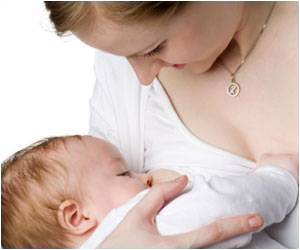- Various health benefits of breast milk to babies are a well-known fact
- A new study shows one more benefit that encourages breastfeeding among women
- Yes, babies who were breastfed for more than six months had IQ scores higher than average
Read More..
How Beneficial Is Breast Milk?
At present, there is a shortage of baby formula, and many women are reviewing their opinion of breastfeeding. This new health benefit will encourage the practice more. According to the American Academy of Pediatrics, and the World Health Organization, breast milk is considered to be the optimal source of nutrition for infants. They recommend exclusive breastfeeding for about six months, then continuing it for one year or longer as solid foods are introduced (1✔ ✔Trusted SourceBreastfeeding
Go to source).
Till now no commercial formula has ever been able to replicate its unique qualities. The benefits of breast milk are obesity prevention and reduced occurrence of infections and allergies. Boosting the baby’s intelligence is also one of them (2✔ ✔Trusted Source
Benefits of breastfeeding
Go to source).
Earlier it was thought that breastfeeding helps to boost a child’s IQ, but other factors such as the mom’s education level and/or social standing could also be responsible for this benefit (3✔ ✔Trusted Source
The Influence of Breastfeeding and the Infant’s Social Environment on Neuroplasticity and Brain Development: The First 1000 Days
Go to source).
Breastfeeding Plays a Crucial Role In Babies’ Intelligence
To examine whether the association between breastfeeding and cognition could be influenced by the socioeconomic conditions and the mother’s intelligence, researchers from the University of Oxford in the United Kingdom wanted to analyze information collected from the UK Millennium Cohort Study. Nearly 7,900 infants who were born between 2000 and 2002 were followed up until they reached the age of 14.During the study period they looked at factors such as duration of breastfeeding, child’s verbal cognition scores at ages 5, 7, 11, and 14 along with spatial cognitive scores when the children were 5, 7, and 11.
They also examined the socioeconomic characteristics of the child’s life and the mother’s cognitive abilities based on a vocabulary test.
The results showed that children who were breastfed the longest had higher verbal and spatial cognition scores with the average scores being 0.08 to 0.26 points greater than scores of children who were never breastfed (4✔ ✔Trusted Source
To what extent does confounding explain the association between breastfeeding duration and cognitive development up to age 14? Findings from the UK Millennium Cohort Study
Go to source).
Even after considering socioeconomic factors and the mother’s intelligence there were still slight associations between breastfeeding and an improvement in the child’s intelligence. This doesn’t mean that children of women who are not able to breastfeed will be at a disadvantage.
"It is important to remember that the potential gains in cognitive ability among children breastfed for several months would be equivalent to just 2-3 IQ points in the usual IQ scale, in which the average is 100," said the study lead author Reneé Pereyra-Elías.
Breast Milk Is A Soulful Gift To Your Baby
Doctors should encourage pregnant women to consider breastfeeding atleast for the first few weeks.Breastfeeding not only provides health benefits but also emotional benefits as it increases the bonding with your baby.
If you used to breastfeed but stopped, start breastfeeding again. Still, many women are unable to breastfeed for factors that are out of a woman’s control. And some women choose not to.
It’s their choice and no one is judging them for their choice to feed their babies but a wise choice can be made which will benefit both mother and child.
References:
- Breastfeeding - (https://www.who.int/health-topics/breastfeeding#tab=tab_1)
- Benefits of breastfeeding - (https://www.nhs.uk/conditions/baby/breastfeeding-and-bottle-feeding/breastfeeding/benefits/)
- The Influence of Breastfeeding and the Infant’s Social Environment on Neuroplasticity and Brain Development: The First 1000 Days - (https://www.intechopen.com/chapters/58880)
- To what extent does confounding explain the association between breastfeeding duration and cognitive development up to age 14? Findings from the UK Millennium Cohort Study - (https://journals.plos.org/plosone/article?id=10.1371/journal.pone.0267326)
















